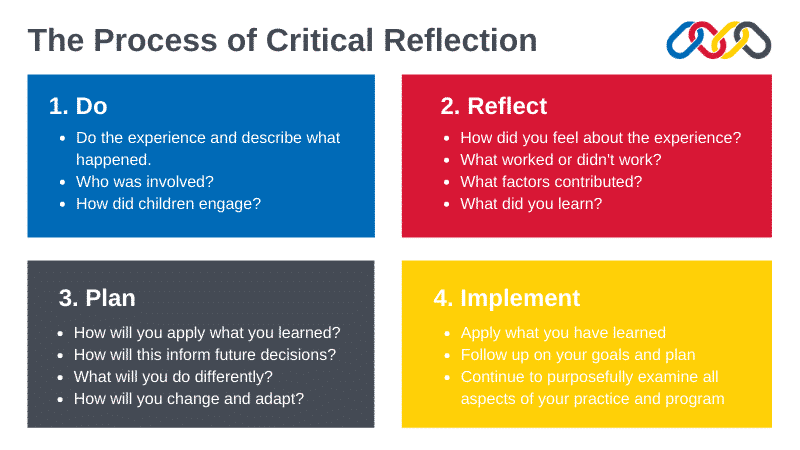What is Critical Reflection?
Critical reflection refers to the ability to examine all aspects of your program, practice, and service environment with honesty and purpose.
It is the process of analysing, questioning, and reframing events and experiences for the purpose of learning and improving practice.
The ultimate goal of critical reflection is to deliver the best possible outcomes for the children in our care.
Why is Critical Reflection Important?
Critical reflection helps us make changes and improvements to our practice, knowledge, actions, interactions, and learning environment.
It is a crucial part of meaningful learning and practice improvement. Put simply, critical reflection makes us better educators and enriches children’s learning.
Questions to Promote Critical Reflection
Questions to promote critical reflection should dig deeper than surface-level observations of what learning occurred.
They should seek to investigate alternative approaches, evaluate the learning that occurred from different perspectives, and form a specific, timely, and measurable action plan for improvement.
True critical reflection requires a readiness for change, a willingness to challenge yourself and others, and the ability to adapt and take on feedback.
- What is my understanding of each child?
- How and why were decisions made?
- What theories, philosophies, and understandings shape my practice?
- Who is advantaged when I work in this way? Who is disadvantaged?
- How do my own thoughts, feelings, and experience influence my practice?
- What isn’t working and why? How can I improve next time?
- What am I challenged by? How can I further my students learning and my own?
- How can I incorporate feedback?
- What perspectives or theories can I draw on to enrich my practice?
- How will I track my progress towards my goals?
How to Explain Montessori Academy’s Process of Critical Reflection
At Montessori Academy, we critically reflect in several ways to ensure that our educational program and practice is engaging and enhances children’s learning and development.
Daily Practice of Critical Reflection
Daily, we complete the critical reflection on our daily EYLF Curriculum Planning sheets to review what activities were most engaging, what worked and why, how children were included, what learning occurred, and how it linked to the EYLF outcomes.
We also record spontaneous teaching moments, lessons learned, and plan where to go from here to extend on children’s interests and skills.
We use a green pen to record intentional teaching, a blue pen to record children’s interests, and a black pen to record sustainability and spontaneous learning activities. We use different coloured pens to track key learning moments to inform our future practice.
The next step is implementing the ideas that come from the process of critical reflection. We do this by adding or changing activities on our daily EYLF Curriculum Planning sheets, adding the interest to our Web, and recording our observations and learning stories through KeptMe.
These observations are then shared with our families through KeptMe, and we receive feedback through likes, comments, and general feedback at pick up and drop off.
Critical reflection is embedded in our daily practice and informs our approach to educational programming.
Weekly Critical Reflection
Weekly, we reflect on the EYLF Curriculum Planning sheets, family feedback, comments on KeptMe, WOW moments, and children’s interest web.
These reflections form the basis of our educational program for the following week.
Each week, we actively look for ways to incorporate the EYLF Learning Outcomes into our program and practice to support children’s belonging, being, and becoming.
Monthly Critical Reflection
Monthly, we review and reflect on one Quality Area company-wide. Montessori Academy shares recommended resources through the Staff Newsletter, which includes ACECQA articles, podcasts, and other resources that encourage reflection on the nominated Quality Area.
Families provide feedback on the nominated Quality Area through monthly National Quality Standards (NQS) surveys. Montessori Academy recently introduced a gift-voucher prompt to encourage higher parent-participation rates and more meaningful feedback.
Services review survey feedback in the monthly staff meeting and share their key learnings, ideas, and reflections to improve understanding and competency relating to the nominated Quality Area.
Follow Up and Follow Through
Once services have reviewed the survey feedback and reflected together as a team, they compile their findings and form an action plan with specific, measurable, attainable, realistic, and timely (SMART) goals.
The goals and action plans for each Quality Area are added to the Service’s Quality Improvement Plan (QIP) and communicated to families via email. This process encourages collaboration and a sense of shared responsibility between families and educators.
Progress towards achieving goals is recorded in the QIP and sent to families for their input. Collaborative relationships between families, educators, and children are crucial to reflective practice.

